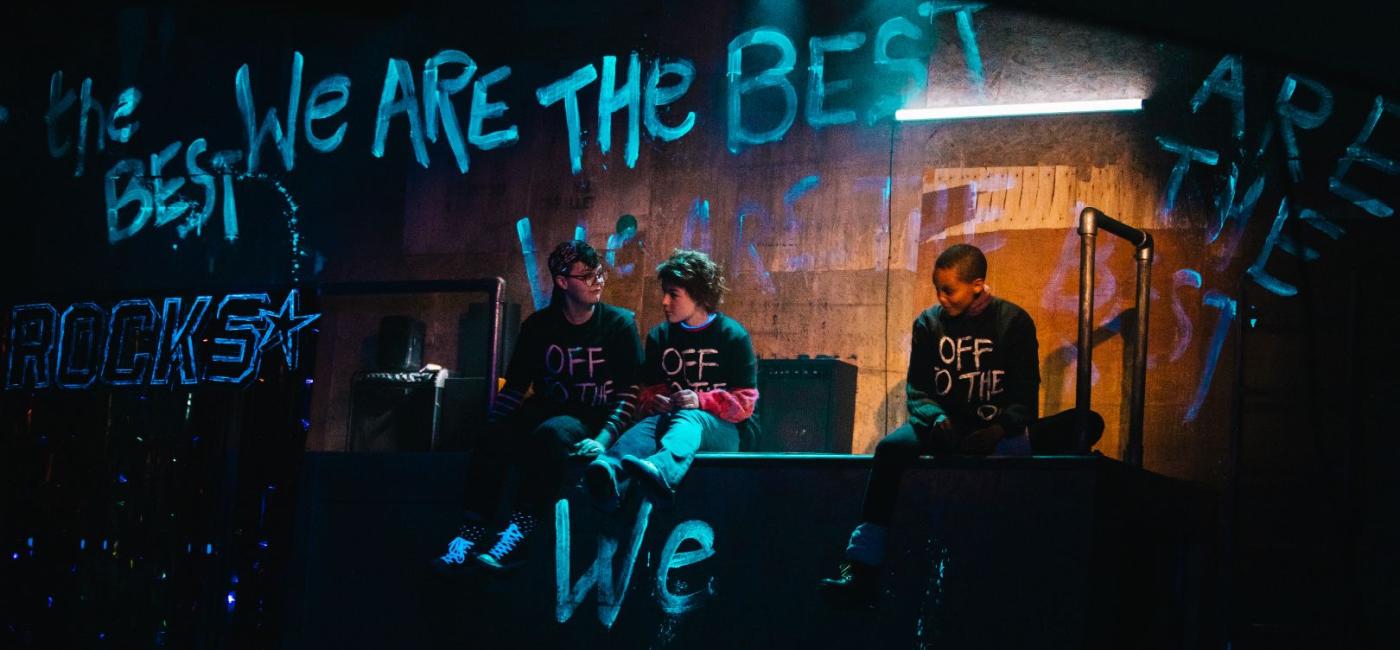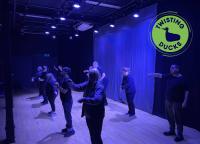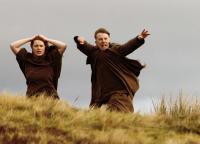How We Made We Are The Best - Part 3

Jack McNamara's Director’s Blog – How we made We Are The Best! - Part 3 Opening, reactions, reflections
Opening
Teching a show with as much going on as We Are The Best! in only two days was slightly laughable, although the laughter stopped quite quickly. It was in no way a joyless process but the sheer volume of stuff to get through was at distinct odds with the organic looseness of the rehearsal room. There’s always a slightly sad moment where the actors twig that the attention they have received from you thus far has now been temporarily replaced with a preoccupation with lanterns and volume levels. But a big part of this show was always going to be its staging. We wanted to fill the room and push at the edges of what the stage space was capable. We used height and distance in unusual ways. The very fact that this was a story about young people and their often marginalised experience, made us want to create something of epic proportions.
Our production manager Drummond Orr did a sterling job keeping us on track and disguising any sense of panic he may have had that may not get it all done in time. The sheer amount that these actors would have to do backstage was mind blowing. The amount of changes, costumes, wigs flying around (how have I managed to make 15 years of theatre without ever using wigs?) is a chaos the audience would never see. Craig Davidson managed the madness backstage with stoic resolve as did the amazing costume supervisor Lou Duffy. After two years of Covid closures I had perhaps forgotten the sheer human toil of what goes into putting on an actual real life show (when I staged a play on WhatsApp over lockdown which played in cities around the world the whole thing was run by one technician and his thumb). But this show was clearly going to be a human factory.
But then we opened and overnight the minutiae of marks, levels, cues and decisions all started to flow into each other and we could (almost) relax again. From the minute the actors met an audience who greeted them with so much noise and love, then we stopped worrying about the vastness of the machine we had created. We could just switch the keys on and let it roll. This show was made for the audience, with an acute awareness of them. Not just in terms of laughs, but in its sense of outward presentation. It was a show was about performance, as entertainment and as a form of identity. The audience were clearly the missing cast members we forgot we needed.
The actors settled into their new home pretty much instantly. The three younger ones were clearly at ease, as every time I saw the show new improvs were being slipped in. 99% of the time these were perfect– some were occasionally deep in the realms of absurdity. But they clearly saw this this as a place to play. The three older actors filled the space beautifully too. We had to restrain ourselves from sliding at high speed down the skate board ramps too often (sliding really adds to the emotional truth of a scene, we found…). Bex and I continued giving them notes but it wasn’t long before it became clear we weren’t really needed anymore. The show was starting to belong to them.
Reactions
Our opening night was noisy and cheery. Our reviews started to flock in and pretty much all of them were full of love. All except one that is. I could talk about the content of the good reviews but that would make for particularly bland reading. The one bad review we received is worth thinking about, as it raised an interesting fundamental question.
The review ultimately took issue with the fact that the drama lacked obstacles, that it followed the story of three friends who for the most part get on. I can see that this definitely doesn’t make it typical of most drama, with its tensions and stakes and catharsis. So the reviewer is not wrong. No one dies, no one is blocked, no differences prove irreconcilable. The drama is built out of a series of subtle changes and developments, rather than big swathes of conflict. In fact we actively resisted giving the play those obvious markers of drama. Were we wrong to?
The reservation in the review was useful in reinstating for me what we were trying to do with this project in the first place. We never set out to make Death of a Salesman, that would be a whole different enterprise. Instead the particular challenge of We Are The Best was to dramatize friendship. In all its strange shifts and developments. On a dramaturgic level we could have introduced all kinds of obstacles, issues and fall outs, to give the narrative clearer sense of dramatic anchors. But that was not the experiment here. We made a piece of work that we wanted to have a different effect, resisting the usual tensions. Why? Because that felt true to the particular experience of those teenage years, somewhere between dependence and independence. A time where it is all about friendships and their evolution. Where the people trying to stop you appear ridiculous rather than sinister. When you haven’t quite opened the door to your feelings and their implications.
An example is the first scene that teenage Bobo gets their drunk mum ready for bed. We could have really pushed the sadness of this scene, deepening the tension between them. But for us something felt truer, and maybe sadder, for Bobo to accept the situation with their mum and at times almost defend her. We don’t need Bobo to take an active position against their drunk mother for us to feel ultimate tragedy of it. Similarly, in another scene, Hedwig’s mum punishes the two friends for cutting her daughter’s hair and makes them read some pages of the bible and then threatens them with joining the church. The threat however fizzles away. After an initial ultimatum (church or prison) she decides to withdraw and leave them with a simple message, that ‘people say no in lots of different ways.’ This isn’t the meaty dramatic outcome you might want from a punishment scene. But something about it strikes me as deeply authentic. Conflicts can be slippery, and don’t always amount to what we imagine them to be. Our lives are not just punctuated by major pothole events. We go through things that are ambiguous, unexpected, anti-climactic, lower or higher key than they should be. For some this isn’t quite what makes a play. But for me it captured something real, albeit breezier than Greek drama.
Reflections
So we were experimenting with a different type of storytelling here. Each show has a different personality and set of rules. Personally I am drawn to pushing myself to enter into entirely new terrain with each show, where there are very few past tropes that you can rely on. As soon as I get a sense that something really ‘works’ onstage I feel inclined to fight against it and see what else might be possible. Perverse maybe but there we go. Sometimes a piece of work will dictate very clearly what it wants and others will keep themselves open. I’m increasingly more drawn to the latter. Beckett is obviously one of the greats but the last Beckett I did (Texts for Nothing at Southbank Centre) I felt a bit like I was parking a car. The words and tone were so fixed they knew exactly where they wanted to go. I just had to get it there. With We Are The Best I never once felt like a parking attendant. Yes I had to get us there but I was never going to do that on my own. It was about the spirit we created together, all of us, and the imaginations of that particular group of people at that particular time. We were a band after all.
We Are The Best! ends on Saturday 18 June. Get your last minute tickets below.
Book now



